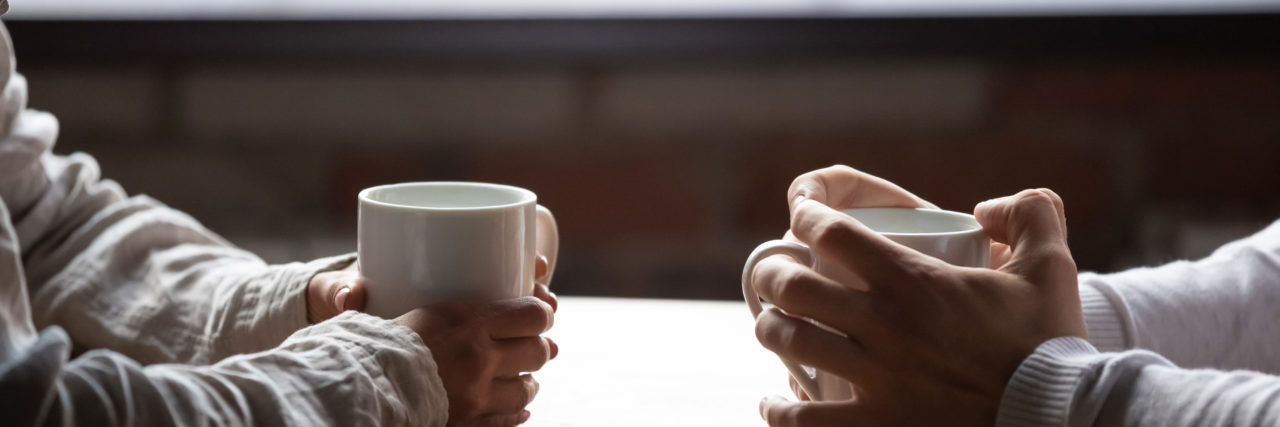4 Things I've Learned About Parceling Out My Plate Since Becoming a Caregiver
I meet you as we’re waiting in line for lunch at the hospital cafeteria. We’re both a bit bleary-eyed from successive nights of tossing and turning on the sofa beds in our childrens’ hospital rooms. You ask if I want to join you at a quiet table near the window, with a perspective (although limited) of the outside world.
As we slide into the stiff plastic chairs and manage to fit both of our trays on the compact table, you say, “You’ve got a lot on your plate.”
I smile because I know you’re not referring to the food I’m about to consume.
“You too,” I respond knowingly, because having a full plate comes without question to the role of being a caregiver.
“How are you managing?”
I exhale deeply as my tense shoulders relax and I give thanks for you, my new friend, who has seen me and cares about how I’m doing. I stir two packets of sugar into my iced tea and take a long sip before I begin so I can collect my thoughts.
“Stumbling through these past two months has taught me a few things about parceling out my plate, and I’m clearly doing better in some areas than others.”
You nod as I go on.
I’ve learned that sometimes I can say “no” to what gets added to my plate.
After my son’s admittance from the ER to the ICU in January, I decided, when I caught glimpses of news headlines, that I just couldn’t take on impeachment or Iran. News-worthy events that I would have followed under normal circumstances I could pretty easily choose to keep off my plate.
When a loved one shared concerns with me about our family’s future, it hit closer to home than the news, but in a similar way I made the decision not to internalize those worries. I could hear them and even acknowledge them without taking them on myself. I certainly didn’t need any more reasons to stay awake at night.
I’ve learned that sometimes I have to take on my plate what I would rather not.
Our son who was not hospitalized dealt with some medical issues himself: stomach pains, bloody noses, fever plus cough. Each time an issue emerged, I told myself I really didn’t want to take on anything that felt “extra.” But his needs required attention that I wasn’t able to take off my plate.
In an effort to pay better attention to that son’s emotional needs and not wanting him to experience the Forgotten Child Syndrome, I contacted his school guidance counselor to let her know what was going on with our family. I also found a counselor through our church for him to have the opportunity to process the complex issues of his life.
I’ve learned that I need to regularly touch base with my husband on the status of our plates.
As a parenting team, we are trying to juggle physical therapy,
occupational therapy, speech therapy, music therapy, doctor
appointments, overnight hospital stays, and home-bound tutoring, as well as our other son’s school activities. But we don’t want our conversations to only be about scheduling, insurance paperwork, blood count numbers, or medications. We need to intentionally take breaks from the Cancer Center our lives have been revolving around.
While my husband and I are journeying through our son’s cancer together, we’re different people with unique roles in life, so our plates are not the same. Finding out what each other needs to let go of and what we each need more of is crucial to “sharing the load,” as our default reaction to the added stress in our lives would be to find fault with each other. Carving out time to listen to each other’s hearts and to ask “What do you need right now?” is an area we’re currently working on.
I’ve learned the importance of answering the question, “What do you need on your plate?”
It’s important to identify what brings life and what drains it. In order to make my life as a caregiver sustainable for the long-haul, I need to be sure my life-giving activities outweigh my life-draining ones. Topping my introverted list of what fills me up are reading, writing, taking walks, meeting with friends and family face-to-face or over the phone, spiritual direction, dates with my husband, and connecting with a soul care mentor who has been through cancer. I also just made an appointment today to see a counselor next week.
Sometimes people ask the general question, “What can I do?” and sometimes they offer practical suggestions. One of our most helpful offers was my mom flying out to support our family during our son’s first round of chemo. Because she and my husband handled both the hospital and our home together, I was able to attend a four day retreat as part of my two year Soul Care Institute program. Thinking through the specifics (meals, rides, childcare, etc) that will enable us to get more of what we need on our plates, will allow others to help us thrive and not just survive as caregivers.
Now that you’ve finished your lunch, I’m interested in hearing your story (I pick up my turkey sandwich and ask how you’re managing).
What have you learned about parceling out your plate these days?
Photo credit: fizkes/Getty Images

